104 items found: Search results for "business" in all categories x


March 5, 2024 | Blog, Culture, News
Learn more about our efforts and our progress towards becoming an environmentally friendly company for the Mayor’s Business Climate Challenge (BCC) in 2023 in this final update.


September 19, 2023 | Blog, Culture, News
In this blog we share the latest developments in our efforts to create a more sustainable business as part of The 2023 Mayor’s Business Climate Challenge.
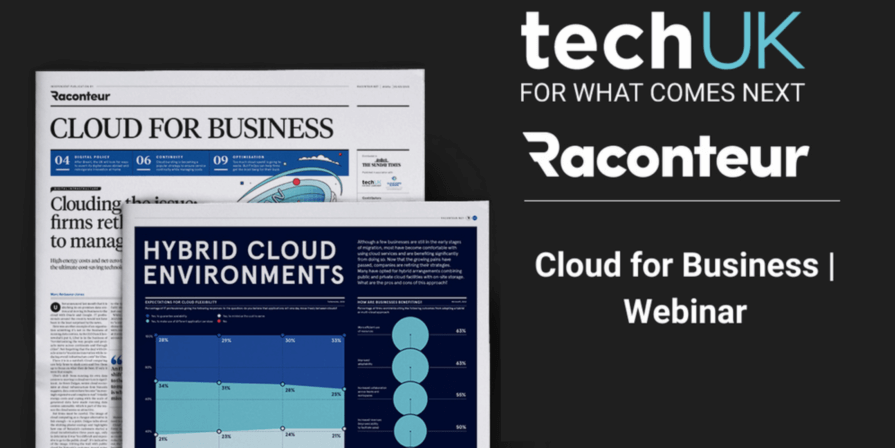
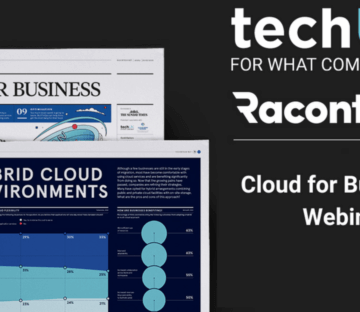
Check out the recording of our CEO/CTO Nicki Watt, and other panellists at the Raconteur and techUK webinar discussing “The Cloud for Business Report,” which was published in The Sunday Times on 5th March 2023.


January 20, 2023 | Blog, Culture, News
OpenCredo is thrilled to be a part of the 2022/2023 Mayor’s Business Climate Challenge (BCC). Read this blog to learn more about our initiatives to lower carbon emissions as part of the voluntary energy efficiency programme!


July 31, 2018 | Machine Learning
Machine Learning, alongside a mature Data Science, will help to bring IT and business closer together. By leveraging data for actionable insights, IT will increasingly drive business value. Agile and DevOps practices enable the continuous delivery of business value through productionised machine learning models and software delivery.




October 4, 2016 | Software Consultancy
As many of you know, OpenCredo are part of the global Trifork family, and as such have access to the combined knowledge and experience of many technology and business leaders throughout the group. Getting public access to all of this expertise and technical leadership can be tricky – until now. GOTO Accelerate is a one-day business focused conference that has emerged from the very successful GOTO technology events.


November 24, 2015 | DevOps, Microservices
It was once again a privilege to present at the annual ‘muCon 2015‘ microservices conference held in London (at the shiny new Skillsmatter CodeNode venue). Based on feedback fro talks I gave earlier in the year, I presented a completely new version of my ‘The Business Behind Microservices‘ talk, which focuses on the organisational and people side of implementing a microservice-based application.


September 24, 2015 | Microservices
Unless you’ve been living under a (COBOL-based) rock for the last few years, you will have no doubt heard of the emerging trend of microservices. This approach to developing ‘loosely coupled service-oriented architecture with bounded contexts’ has captured the hearts and minds of many developers. The promise of easier enforcement of good architectural and design principles, such as encapsulation and interface segregation, combined with the availability to experiment with different languages and platforms for each service, is a (developer) match made in heaven.


September 18, 2015 | Microservices
We’re pleased to begin our series of OpenCredo webinars with “The Business Behind Microservices”, which takes a look at the some of the business and organisational challenges that come along with the decision to implement microservices.




March 28, 2024 | Blog, Platform Engineering
Watch the recording of our CEO/CTO, Nicki Watt from the KubeCon + CloudNativeCon 2024 on her talk “To K8S and Beyond – Maturing Your Platform Engineering Initiative.”


February 22, 2024 | Blog, Kafka
Check out Peter Vegh’s latest blog where he explores a bespoke Kafka backup framework, discussing the approach, architecture and design process to implement and deliver the solution.


October 30, 2023 | Blog
As impressive as they are, Large Language Models (LLMs) face difficulties when creating long-form content, primarily due to token limitations and inconsistencies in the output over time.
Together with Livy.ai, we developed a “Hierarchical Expansion” method to address these challenges and better the quality, flow, and structure of the content produced. Read further to learn more!
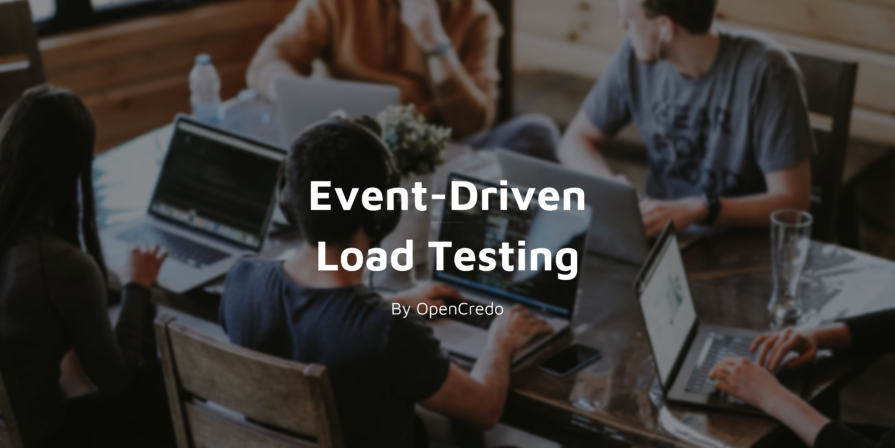
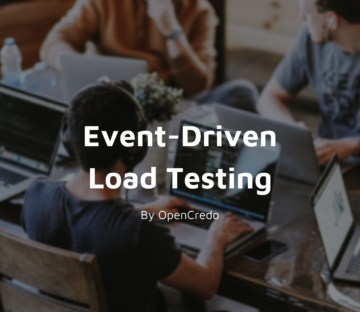
October 12, 2023 | Blog, Platform Engineering
Check out our latest blog “Event Driven Load Testing” which explores how, through some smart automation techniques, testing strategies can be adapted to support scale-up organisations where there are potentially many disparate teams needing to work together.
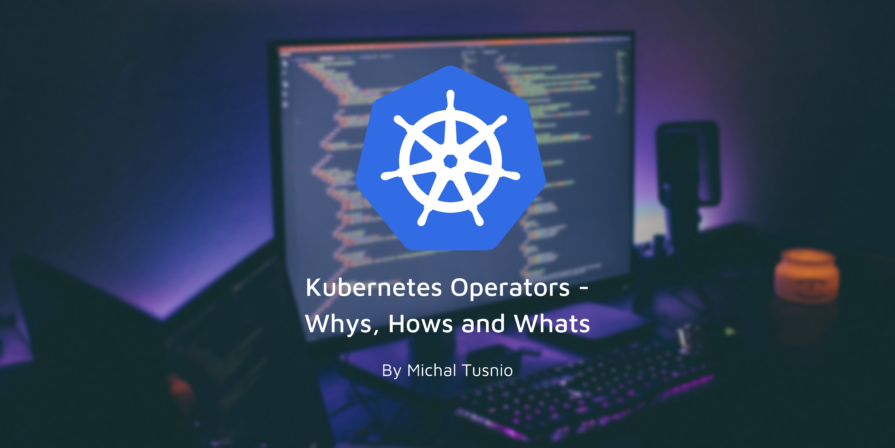
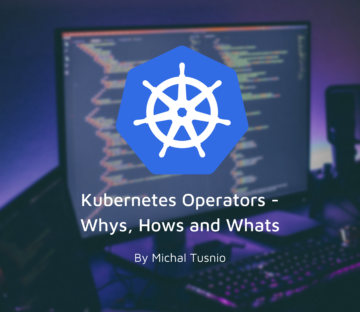
September 27, 2023 | Blog, Kubernetes
Learn to create your first Kubernetes operator by checking out our Senior Consultant Michal Tusnio’s latest blog, “Kubernetes Operators – Whys, Hows and Whats” where he takes you on a journey from zero to operator.


September 8, 2023 | Blog
We were recently awarded ‘Britain’s Healthiest Workplace for SMEs’ by Vitality. Read on to learn more about our journey to achieving this award and what we are doing to improve our workplace culture.
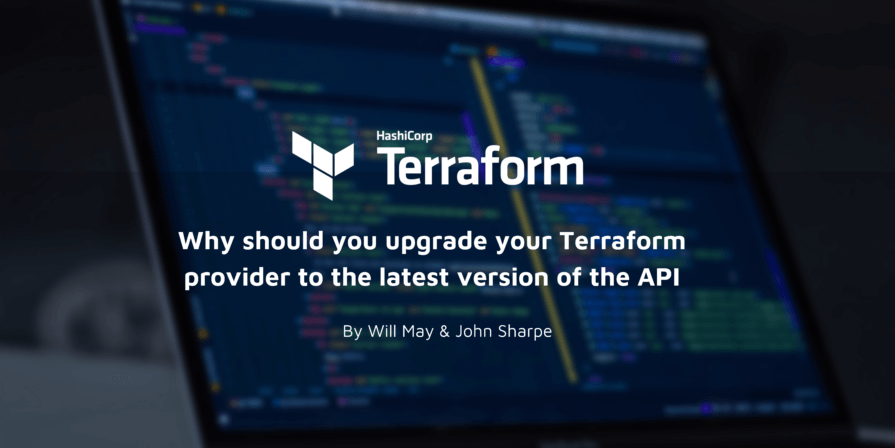
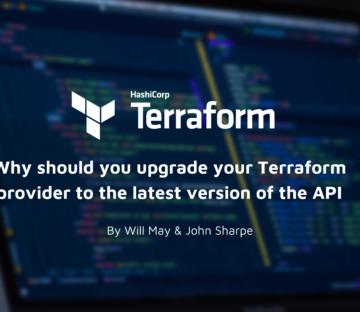
August 17, 2023 | Blog, Terraform Provider
Check out John Sharpe and Will May’s latest blog where they give suggestions for Terraform Provider authors who are thinking about upgrading from SDKv2 to Framework

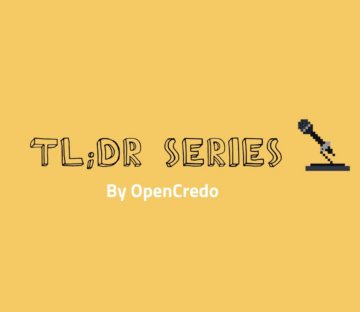
April 21, 2023 | Blog, Data Engineering, Data Governance, Data Mesh, OPA
Check out Mateus Pimenta’s TL;DR video to learn how federated computational governance could be implemented using Open Policy Agent (OPA) and policy-as-code to support a successful Data Mesh architecture.


February 1, 2023 | Blog, Data Analysis, Neo4j
As data becomes ubiquitous and deeply interconnected, tracing where who or which system that data comes from – its lineage – will create bigger problems and opportunities for us on the horizon. Watch the recording of James Bowkett talk from NODES 2022 – Neo4j Online Developer Education Summit 202 on ‘Tracing Your Data’s DNA.’
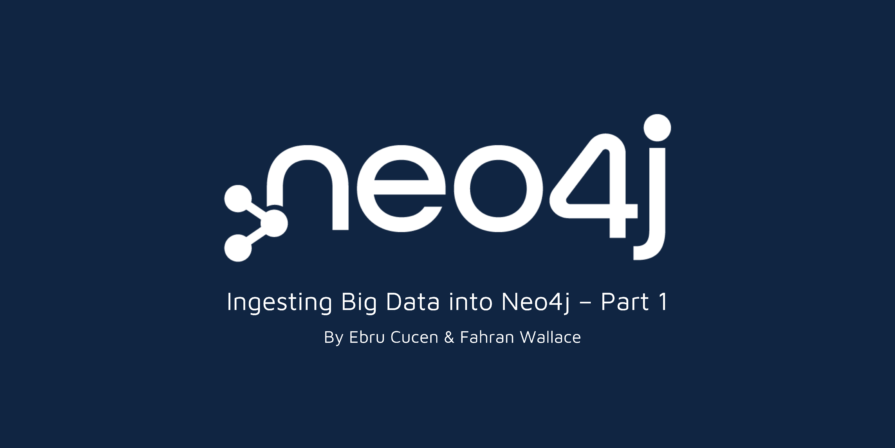
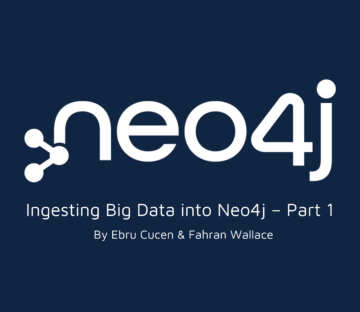
January 26, 2023 | Blog, Data Analysis, Neo4j
Fahran Wallace and Ebru Cucen’s most recent blog post is part 1 of a three-part series. They investigate how OpenCredo ingested 400 million nodes with a billion relationships into Neo4j.

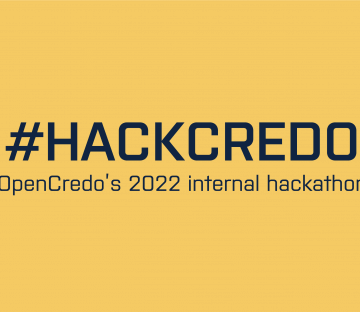
As we are passionate about using technology to solve problems, we are thrilled to share with you our internal competition, “HackCredo.” Read on to learn more about the competition, the groups, and the winners.

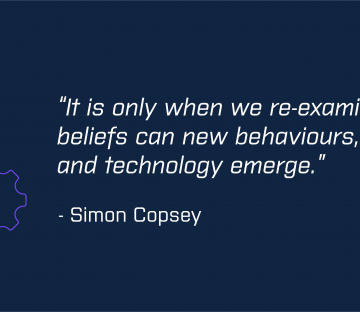
June 29, 2022 | Blog, Organisational Transformation, Software Consultancy
Many businesses advocate for efficiency, but this is not always the right goal.
In part one of this article, we explored how product teams can balance two important considerations – efficiency and effectiveness.
In this second part we will introduce the – often unexpected – implications of turning to technology to bring about efficiency and wider change, and the deeper considerations that must be addressed first.


June 14, 2022 | Blog, Culture, White Paper
Many businesses advocate for efficiency, but this is not always the right goal. Part one of this article explores how product teams can balance two important considerations – efficiency and effectiveness. Part two builds on this idea, uncovering the non-obvious implications of using technology to bring about efficiency and wider change.


May 26, 2022 | Data Analysis, Data Engineering
As data becomes ubiquitous and deeply interconnected, tracing where who or which system that data comes from – its lineage – will create bigger problems and opportunities for us on the horizon. Watch the recording of James Bowkett’s talk from Devoxx UK on ‘Tracing Your Data’s DNA’

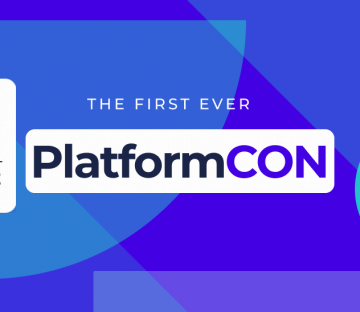
May 26, 2022
Our CEO/CTO Nicki Watt shares about her upcoming talk at PlatformCon 2022.


May 24, 2022 | Software Consultancy
Watch Simon Copsey’s talk from the Agile Ex Meetup on “Coaching at the Organisational Level” where he explores some of the common downward spirals in IT and the larger organisation, as well as the tools that coaches and individuals can use to surface and discuss them in a way that allows for systemic change, even without formal authority.

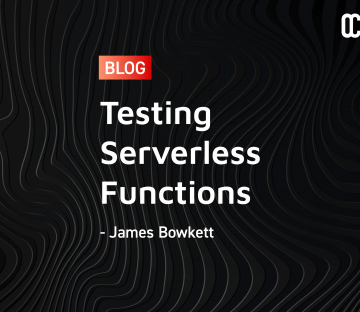
February 11, 2022 | AWS, Cloud, GCP, Kubernetes, Microservices, Open Source, Software Consultancy
Serverless functions are easy to install and upload, but we can’t ignore the basics. This article looks at different strategies related to testing serverless functions.


November 4, 2021 | Kubernetes
We always read that ‘security is everyone’s responsibility’. For any organisation, big or small, security should always be the primary concern—not a mere afterthought. In terms of Kubernetes, securing a cluster is challenging because it has so many moving parts and, apart from securing our Kubernetes environment, we also want to control what an end-user can do in our cluster.
To achieve these goals, we can start with the built-in features provided by Kubernetes like Role-Based Access Control (RBAC), Network Policies, Secrets Management, and Pod Security Policies (PSP). But we know these features are not enough. For example, we may want specific policies like ‘all pods must have specific labels’. And even if we have the policies in place, the next big question is how to enforce them on our Kubernetes cluster in an easy and repeatable manner.
In this blog post, we’ll address this challenge and other questions pertaining to OPA and how it can integrate into Kubernetes.

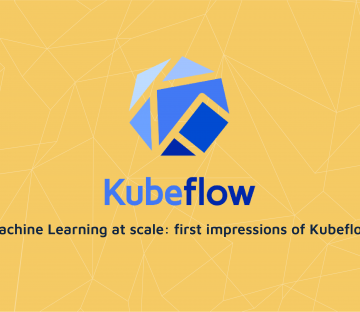
April 20, 2021 | Data Engineering, Machine Learning, Software Consultancy
Our recent client was a Fintech who had ambitions to build a Machine Learning platform for real-time decision making. The client had significant Kubernetes proficiency, ran on the cloud, and had a strong preference for using free, open-source software over cloud-native offerings that come with lock-in. Several components were spiked with success (feature preparation with Apache Beam and Seldon for model serving performed particularly strongly). Kubeflow was one of the next technologies on our list of spikes, showing significant promise at the research stage and seemingly a good match for our client’s priorities and skills.
That platform slipped down the client’s priority list before completing the research for Kubeflow, so I wanted to see how that project might have turned out. Would Kubeflow have made the cut?

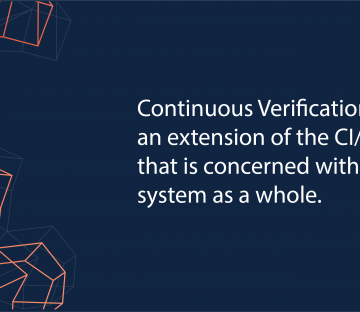
October 15, 2020
Continuous Verification is a term that is starting to pop up from time-to-time… but what does it mean? Well… according to Nora Jones and Casey Rosenthal, authors of O’Reilly’s Chaos Engineering books,
“Continuous verification (CV) is a discipline of proactive experimentation, implemented as tooling that verifies system behaviors. This stands in contrast to prior common practices in software quality assurance, which favor reactive testing, implemented as methodologies that validate known properties of software. This isn’t to say that prior common practices are invalid or should be deprecated. Alerting, testing, code reviews, monitoring, SRE practices, and the like—these are all great practices and should be encouraged”
Over the course of this post, we will unpack this statement: to understand what is behind it and what it might mean for your development process.
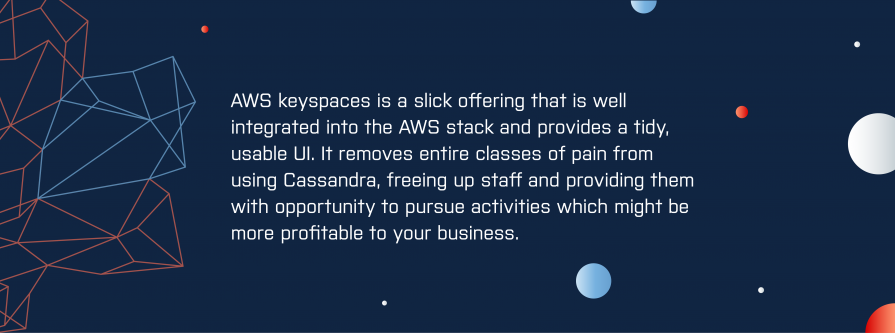
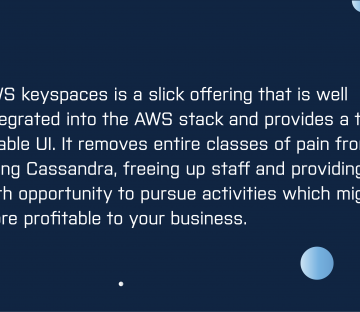
September 22, 2020 | AWS, Blog, Cassandra, Cloud, DevOps, Open Source
With the upcoming Cassandra 4.0 release, there is a lot to look forward to. Most excitingly, and following a refreshing realignment of the Open Source community around Cassandra, the next release promises to focus on fundamentals: stability, repair, observability, performance and scaling.
We must set this against the fact that Cassandra ranks pretty highly in the Stack Overflow most dreaded databases list and the reality that Cassandra is expensive to configure, operate and maintain. Finding people who have the prerequisite skills to do so is challenging.

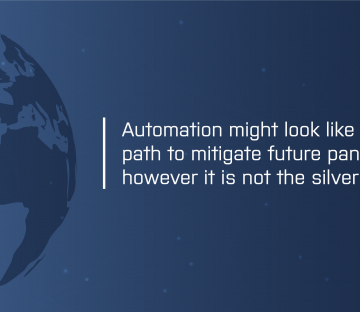
At the time of this post, the UK is making steps to exit from an unprecedented lockdown measures for the Coronavirus. Much of the UK workforce are still making efforts to work-from-home with mainly key workers operating – at risk – in public. Many industries have shut down completely. Consequently, many businesses are reflecting on what happens next and how do we better mitigate future pandemic events?


April 2, 2020 | Machine Learning
Recent years have seen many companies consolidate all their data into a data lake/warehouse of some sort. Once it’s all consolidated, what next?
Many companies consolidate data with a field of dreams mindset – “build it and they will come”, however a comprehensive data strategy is needed if the ultimate goals of an organisation are to be realised: monetisation through Machine Learning and AI is an oft-cited goal. Unfortunately, before one rushes into the enticing world of machine learning, one should lay more mundane foundations. Indeed, in data science, estimates vary between 50% to 80% of the time taken is devoted to so-called data-wrangling. Further, Google estimates ML projects produce 5% ML code and 95% “glue code”. If this is the reality we face, what foundations are required before one can dive headlong into ML?


March 20, 2020
Traditionally, Usability and Security have been set in opposition to each other: with tight security, we end up with painful user experience. In this blog, Guy focuses on financial services as an exemplar of how we can introduce usability into a vertical with challenging security and compliance requirements.


November 13, 2019 | Software Consultancy
Pioneering and pushing technology boundaries – pretty much a given nowadays for the software-driven startup. Here are some insights we’ve observed working with a number of venture capital (VC) companies who have managed to navigate the choppy waters and successfully grow their business including winning further investment along the way.
With our deep hands-on technical expertise and pragmatic focus, OpenCredo has become a natural software acceleration partner for VC funded organisations who are looking to deliver tangible value as effectively as possible. We’ve been brought in to work alongside these innovators at various stages of their journey. As such we’ve gained an appreciation for and acquired, first-hand insight into some of the pressures and challenges faced. From getting and securing that next round of funding, to grappling with the technical decisions and challenges inherent in sensibly evolving offerings to accommodate future growth and scaling.
This blog is written exclusively by the OpenCredo team. We do not accept external contributions.


October 3, 2019
Continuing on from Stuart’s previous blog which covered highlights from CloudNative London conference day 1, I have put together a summary for day 2.
Being an OCer (OpenCredo employee) has given me the opportunity to fully embed myself in the London technology scene. Alongside our direct engagements with clients, it is a chance to understand and evaluate the trends and lessons that have emerged over the past year.
For conferences and technical content, London is a very crowded location. Every day it seems like a new conference is being announced and I know I cannot attend them all, no matter how much I want too! Alongside some of my other colleagues, I was given the option to attend the Skillsmatter CloudNative London conference and with the increase of organisations embracing the dynamic and transformative benefits offered by an ever-growing choice of cloud providers, it seemed like a good fit.

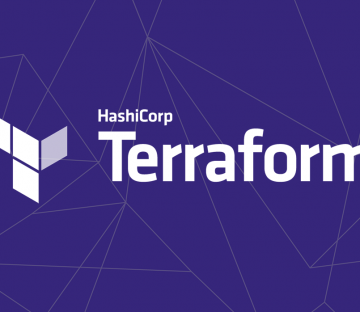
October 3, 2019 | Cloud, DevOps, Hashicorp, Open Source
Terraform 0.12 in recent years has emerged as the de facto standard with regards to defining and managing cloud infrastructure. It is one of four primary tools offered by HashiCorp, (Terraform, Vault, Consul and Nomad) and underpins the workflows that make up their Cloud Operating Model.
Since its first release in 2014, the wider Terraform community has embraced frequent releases and this past year has been no exception. HashiCorp announced the release of Terraform 0.12 in May 2019 and as of writing this post the official release is 0.12.9.


September 12, 2019 | Cloud Native, Microservices, Software Consultancy
As a technology leader, you’ll be aware that competitive pressures and shifting business requirements are driving changes in the technical architectures of many organisations. This means you need a new strategic approach based on the ability to continually evolve elements of your systems and architectures.


Writing your own Kafka source connectors with Kafka Connect. In this blog, Rufus takes you on a code walk, through the Gold Verified Venafi Connector while pointing out the common pitfalls


February 20, 2019 | DevOps, Hashicorp, Kafka, Open Source
Creating and managing a Public Key Infrastructure (PKI) could be a very straightforward task if you use appropriate tools. In this blog post, I’ll cover the steps to easily set up a PKI with Vault from HashiCorp, and use it to secure a Kafka Cluster.


July 13, 2018 | Software Consultancy
As a consultant I often find myself in situations that require tricky problem solving, typically of a technical nature. Yet although it is common to approach a consultancy engagement in terms of its technical context, not all problems have a purely technical solution.


May 16, 2018 | Microservices
To identify service boundaries, it is not enough to consider (business) domains only. Other forces like organisational communication structures, and – very important – time, strongly suggest that we should include several other criteria in our considerations.


April 18, 2018 | Microservices
Quite a few of the anti-patterns we observe today on microservices projects are strongly related to how people approach the problem. Given their nature, these anti-patterns tend to be deeply ingrained and self-sustaining. Addressing them starts with increased awareness and by changing ways of approaching the problem, rather than by the introduction of yet another technical tool or framework.


March 14, 2018 | Data Engineering, Microservices
Events are obviously the fundamental building block of event-sourced systems. Commands are equally a common concept in such systems although the distinction between events and commands, if any, is not always clear. There are certainly varying views on what role each one should play.


February 6, 2018 | Cloud
Among the many announcements made at Re:Invent 2017 was the release of AWS Privatelink for Customer and Partner services. We believe that the opportunity signalled by this modest announcement may have an impact far broader than first impressions suggest.


January 23, 2018 | Data Engineering, DevOps
Machine Learning is a hot topic these days, as can be seen from search trends. It was the success of Deepmind and AlphaGo in 2016 that really brought machine learning to the attention of the wider community and the world at large.


October 24, 2017 | Data Engineering
Cockroach Labs, the creators of CockroachDB are coming to London for the first time since their 1.0 GA Release in May 2017. They will be taking time to talk about “The Hows & Whys of a Distributed SQL Database” at the Applied Data Engineering meetup, hosted and run by us here at OpenCredo.
We have been interested in CockroachDB for a while now, including publishing our initial impressions of the release on our blog. We thought this would be the perfect time to do a bit of a Q&A before the event! I posed Raphael Poss, a core Software Engineer at Cockroach Labs a few questions.


August 9, 2017 | Cloud, DevOps, Terraform Provider
The recent 0.10.0 release of HashiCorp Terraform, saw a significant change to the way Providers are managed. Specifically, the single open source code repository for Terraform has been divided into core and multiple provider repositories.


August 8, 2017 | Cassandra
Recently, the sad news has emerged that Basho, which developed the Riak distributed database, has gone into receivership. This would appear to present a problem for those who have adopted the commercial version of the Riak database (Riak KV) supported by Basho.
This blog is written exclusively by the OpenCredo team. We do not accept external contributions.


July 11, 2017 | Cloud, Cloud Native
Over the years, OpenCredo’s projects have become increasingly tied to the public cloud. Our skills in delivering cloud infrastructure and cloud native applications have deepened and the range of cloud projects we are able to take on has grown. From enterprise cloud brokers to cloud platform migration in restricted compliance environments, our ability to deliver on the cloud is now a core component of our value proposition.


May 9, 2017 | Cassandra
Data analytics isn’t a field commonly associated with testing, but there’s no reason we can’t treat it like any other application. Data analytics services are often deployed in production, and production services should be properly tested. This post covers some basic approaches for the testing of Cassandra/Spark code. There will be some code examples, but the focus is on how to structure your code to ensure it is testable!
This blog is written exclusively by the OpenCredo team. We do not accept external contributions.


April 25, 2017 | Cassandra, Data Analysis, Data Engineering
Apache Spark is a powerful open source processing engine which is fast becoming our technology of choice for data analytic projects here at OpenCredo. For many years now we have been helping our clients to practically implement and take advantage of various big data technologies including the like of Apache Cassandra amongst others.


March 23, 2017 | Data Engineering, Machine Learning
On previous blog posts we have provided examples of different types of acceptance tests coverage, UI, API and Performance. One area where automation is often lacking is around validating the security of the application under test. This has been discussed in the post on non functional testing You Are Ignoring Non-functional Testing. With this post we will enhance the automation framework to quickly check for some common security flaws.


September 6, 2016 | Cassandra
A growing number of clients are asking OpenCredo for help with using Apache Cassandra and solving specific problems they encounter. Clients have different use cases, requirements, implementation and teams but experience similar issues. We have noticed that Cassandra data modelling problems are the most consistent cause of Cassandra failing to meet their expectations. Data modelling is one of the most complex areas of using Cassandra and has many considerations.




July 3, 2016 | DevOps
Several of us from the OpenCredo team were in attendance at the inaugural EU edition of the DevOps Enterprise Summit conference. We have been big fans of the two previous US versions, and have watched the video recordings of talks (2014, 2015) with keen interest as many of our DevOps transformation clients are very much operating in the ‘enterprise’ space.



June 7, 2016 | Software Consultancy
In my previous blog post I explained to you the Seven Deadly Sins of Project Managers. With that post in mind, I would like to share with you my views on what a project manager needs to overcome these sins and become a valuable member of the team, and ultimately helping to achieve success on the project.


May 27, 2016 | Software Consultancy
People make mistakes. People can improve. People need to be told of their mistakes. Surprisingly project managers are people too… I know… in some cases it is really hard to believe it; and then they can improve too! Shocking! I have more than 15 years working in IT, occupying different roles from software development to project management in three different countries. I’ve seen really bad project managers and some really good project managers; Yes, they DO exist!


April 5, 2016 | Software Consultancy
This post is part of a series which introduce key concepts in successful test automation. Each post contains sample code using the test-automation-quickstart project, a sample Java test automation framework available from Github.


March 17, 2016 | Software Consultancy
In order to be able to regularly release an application, your automated tests must be set up to give you fast and reliable feedback loop. If bugs are only found during a long and expensive multi-service or end-to-end test run, it can be a hinderance to fast delivery. Unfortunately I have often seen this problem in development environments: a huge suite of clunky, flaky and slow end-to-end tests which test the full functionality of the application as opposed to being more lightweight and reflecting basic user journeys. This produces the “ice cream cone” anti-pattern of test coverage, where unit tests aren’t providing the kind of coverage and feedback they need to.


March 2, 2016 | DevOps, Microservices
Many of our clients are currently implementing applications using a ‘microservice’-based architecture. Increasingly we are hearing from organisations that are part way through a migration to microservices, and they want our help with validating and improving their current solution. These ‘microservices checkup’ projects have revealed some interesting patterns, and because we have experience of working in a wide-range of industries (and also have ‘fresh eyes’ when looking at a project), we are often able to work alongside teams to make significant improvements and create a strategic roadmap for future improvements.


March 2, 2016 | Microservices
Microservice-style software architectures have many benefits: loose coupling, independent scalability, localised failures, facilitating the usage of polyglot data persistence tools or multiple programming languages.
However, they also introduce other challenges. A major one is the fact that the end-user functionality of the system will ultimately emerge as a composition of multiple services. This significantly increases the complexity of deploying the system. In addition, because we lose the concept of “versions” of the system, it becomes harder to answer questions like “what capabilities are in production?” and “when is a new feature considered ‘done’?”.


January 30, 2016 | Microservices
The OpenCredo team will be presenting two sessions on our recent learnings with implementing microservices at the OOP Conference, which will be running from the 1st – 5th February. We will also be running a booth, and so if you are interested in learning more about our recent projects, are keen to see if we can help you with your latest technical or organisational challenges, or want to join our team, then stop by and say hello!


January 29, 2016 | DevOps
DevOps is 2016’s tech holy grail – unified development and operations, both working to deliver what the business needs, quickly, reliably, and adaptably. Done well, DevOps transforms the way organisations work; it helps break down barriers between tech teams, and between technology and the rest of the business. Good DevOps is the antidote to increasing segmentation and specialisation within companies. With the promised benefits, is it any wonder that senior managers are pushing for it in organisations spanning all sizes and industries?


January 18, 2016 | Software Consultancy
Last time in this series I summarised all the Akka Persistence related improvements in Akka 2.4. Since then Akka 2.4.1 has been released with some additional bug fixes and improvements so perhaps now is a perfect time to pick up this mini-series and introduce some other new features included in Akka 2.4.x.


January 15, 2016 | Software Consultancy
So, you’ve started to hear a lot about React, the Javascript library developed by Facebook, but is it something you need to investigate? It’s time to distil the signal from the noise, position React amongst its rivals, and provide an indication of where it currently would – and would not – be a suitable fit.


January 8, 2016 | Microservices
Many of our clients are in the process of investigating or implementing ‘microservices’, and a popular question we often get asked is “what’s the most common mistake you see when moving towards a microservice architecture?”. We’ve seen plenty of good things with this architectural pattern, but we have also seen a few recurring issues and anti-patterns, which I’m keen to share here.


December 22, 2015 | Software Consultancy
We announced yesterday that CloudCredo has been acquired by Pivotal. In the longer term this will probably solve one of my challenges that is the need to constantly explain the difference between OpenCredo and CloudCredo, since CloudCredo will eventually be absorbed into Pivotal. Yesterday’s announcement has created significant interest, and so I thought I would try to clear things up with a quick post.




December 16, 2015 | Cloud, DevOps
In the rush to embrace DevOps, many organisations seek out tools to help them achieve DevOps nirvana; the magical tools that will unify Development and Operations, stop the infighting, and ensure collaboration. This search for tools to solve problems exists in many domains, but seems particularly prevalent in IT (it may be real, or a reflection of my exposure to IT). The temptation to embrace new tools as a panacea is high, because the problems in IT seem so pervasive and persistent.




November 23, 2015 | Software Consultancy
Over a year ago, my colleague Tristan posted on the OpenCredo blog about a test automation quick start framework. It’s a prepackaged framework you can clone and get going with testing instantly, rather than wasting your time rebuilding your framework every single project. We have used this framework successfully used on many of our internal projects, and it relies upon a Java, Cucumber-JVM and Selenium stack.


November 1, 2015 | Microservices
To use or not to use hypermedia (HATEOAS) in a REST API, to attain the Level 3 of the famous Richardson Maturity Model. This is one of the most discussed subjects about API design.
The many objections make sense (“Why I hate HATEOAS“, “More objections to HATEOAS“…). The goal of having fully dynamic, auto-discovering clients is still unrealistic (…waiting for AI client libraries).
However, there are good examples of successful HATEOAS API. Among them, PayPal.


October 31, 2015 | Microservices
Over the past few weeks I’ve been writing an OpenCredo blog series on the topic of “Building a Microservice Development Ecosystem”, but my JavaOne talk of the same title crept up on me before I managed to finish the remaining posts. I’m still planning to finish the full blog series, but in the meantime I thought it would be beneficial to share the video and slides associated with the talk, alongside some of my related thinking. I’ve been fortunate to work on several interesting microservice projects at OpenCredo, and we’re always keen to share our knowledge or offer advice, and so please do get in touch if we can help you or your organisation.


October 30, 2015 | Cloud, DevOps
In some companies, the inevitable rapidly became accepted as the way to do things, and both development and IT operations worked together to figure out how to collaborate on building systems that satisfied development’s desire for change, and operations desire for stability. Outsourcing infrastructure, and all it implied, gave rise to Devops – the unification of business needs, developer delivery, and operational capacity – but it also gave rise to something else, in companies where the operations teams weren’t quite as quick to move – Shadow IT.


October 28, 2015 | Software Consultancy
Let’s have a quick look at the most interesting changes and new features that are now available to Akka users. As there are many new features to highlight in the new Akka release I will focus on those related to Akka Persistence first and cover other areas in a separate post.


October 18, 2015 | Cloud, DevOps
Last week Steve Poole and I were once again back at the always informative JAX London conference talking about DevOps and the Cloud. This presentation built upon our previous DevOps talk that was presented last year, and focused on the experiences that Steve and I had encountered over the last year (the slides for our 2014 “Moving to a DevOps” mode talk can be found on SlideShare, and the video on Parleys).


October 12, 2015 | DevOps
DevOps is transformative. This (hopefully) won’t be true forever, but it is for now. While the modern management practices of separating development and operations (and to a lesser extent, everyone else) prevail, the tearing down of the walls that separate them will remain transformative. In company after company, management and front-line staff are coming to realise that keeping functions separate, which are inherently interdependent, is a model for blame, shifted responsibility, and acrimony. It’s easy to divvy-up a company up based on function. To many people, it seems the most logical way to do it. Ops does operations, Dev does development, Marketing markets, etc. It seems much harder to do it any other way. So why do it?


October 7, 2015 | Software Consultancy
It’s well known that predicting how long a project/task will take in IT is hard. In this post I’ll address one aspect of this (correlation) and ask what insights a data science perspective can give us about how correlations can make prediction difficult. I’ll explain the problems that correlation poses, give some practical advice for teams & project managers and investigate possible innovations to tooling that might improve matters.


![Microservice Platforms: Some Assembly [Still] Required. Part Two](https://opencredo.com/wp-content/uploads/2018/10/banner-services-895x196.jpg)
![Microservice Platforms: Some Assembly [Still] Required. Part Two](https://opencredo.com/wp-content/uploads/2018/10/banner-services-360x312.jpg)
September 20, 2015 | Microservices
Over the past five years I have worked within several projects that used a ‘microservice’-based architecture, and one constant issue I have encountered is the absence of standardised patterns for local development and ‘off the shelf’ development tooling that support this. When working with monoliths we have become quite adept at streamlining the development, build, test and deploy cycles. Development tooling to help with these processes is also readily available (and often integrated with our IDEs). For example, many platforms provide ‘hot reloading’ for viewing the effects of code changes in near-real time, automated execution of tests, regular local feedback from continuous integration servers, and tooling to enable the creation of a local environment that mimics the production stack.


August 12, 2015 | Microservices
Over the last few months one of my main projects at OpenCredo has involved creating various microservices which are interacted with via REST. We’ve been working with a relatively rich domain model, which in turn has presented a lot of challenges in how to design our various resources. This blog post aims to summarise various techniques and practices which I’ve found helpful in overcoming these challenges.




August 5, 2015 | Cloud, GCP, Kubernetes
Why OpenCredo partnered with Google
Recently OpenCredo chose to partner with Google in order to share knowledge and resources around the Google Cloud Platform offerings. Our clients come in many shapes and sizes, but typically all of them realise three disruptive truths of the modern IT industry: the (economic) value of cloud; the competitive advantage of continuous delivery; and the potential of hypothesis and data-driven product development to increase innovation (as popularised by the Lean Startup / Lean Enterprise motto of ‘build, measure, learn’).










February 16, 2015 | Software Consultancy
Apache Mesos is often explained as being a kernel for the data-centre; meaning that cluster resources (CPU, RAM, …) are tracked and offered to “user space” programs (i.e. frameworks) to do computations on the cluster.


November 21, 2014 | White Paper
In our latest white paper we cover the high level fundamentals of test automation, discuss the primary problems test automation solves and take a look at the steps required to implement this within your development process – all aimed at improving software delivery.
November 19, 2014 | Microservices
Undeniably, there is a growing interest in microservices as we see more organisations, big and small, evaluating and implementing this emerging approach. Despite its apparent novelty, most concepts and principles underpinning microservices are not exactly new – they are simply proven and commonsense software development practices that now need to be applied holistically and at a wider scale, rather than at the scale of a single program or machine. These principles include separation of concerns, loose coupling, scalability and fault-tolerance.


February 24, 2014 | Cloud Native, Microservices
Last year some of us attended the London Spring eXchange where we encountered a new and interesting tool that Pivotal was working on: Spring Boot. Since then we had the opportunity to see what it’s capable of in a live project and we were deeply impressed.


January 28, 2014 | Software Consultancy
A while ago I published this blog post about writing tests for mobile applications using Appium and cucumber-jvm.
In this post, I will look at an alternative approach to testing an Android native application using Cucumber-Android.
Throughout the post I will draw comparisons between Appium and Cucumber-Android, the goal being to determine the best approach for testing an android application using Cucumber. I will focus on the ease of configuration and use, speed of test runs and quality of reporting.


January 7, 2014 | Software Consultancy
Cucumber Pro from a technical point of view
The team over at Cucumber Pro recently posted a sneak peek on their blog, demonstrating some key features of their offering.
As more of a technical user of Cucumber, there isn’t much that’s new or ground-breaking for me – almost every feature is already available through your preferred IDE combined with a few plugins.




February 25, 2013 | Neo4j
As part of our work, we often help our customers choose the right datastore for a project. There are usually a number of considerations involved in that process, such as performance, scalability, the expected size of the data set, and the suitability of the data model to the problem at hand.
This blog post is about my experience with graph database technologies, specifically Neo4j. I would like to share some thoughts on when Neo4j is a good fit but also what challenges Neo4j faces now and in the near future.


News | February 12, 2013


January 10, 2013 | DevOps
Recently I have started looking into SaltStack as a solution that does both config management and orchestration. It is a relatively new project started in 2011, but it has a growing fanbase among Sys Admins and DevOps Engineers. In this blog post I will look into Salt as a promising alternative, and comparing it to Puppet as a way of exploring its basic set of features.


December 18, 2012 | Software Consultancy
The first thing most people think of when they start a project with the good intentions of test driven development is: write a test first. That’s great, and something I would fully encourage. However, diving in to writing tests without forethought, especially on large projects with a lot of developers can lead to new problems that TDD is not going to solve. With some upfront thinking (but not big upfront design!) a large team can avoid problems later down the line by considering some important and desirable traits of a large and rapidly changing test suite.




February 13, 2012 | Software Consultancy
Recently we were approached by a client to do some performance testing of the web application they had written. The budget allowed two days for this task. Ok. No problem. Yes, we can. Naturally I had one or another question though…


February 3, 2012 | Software Consultancy